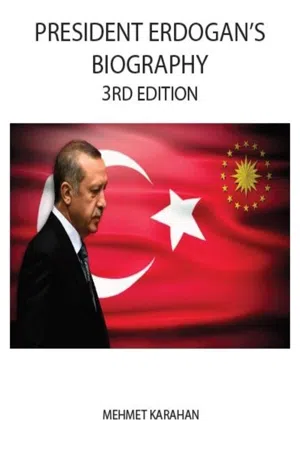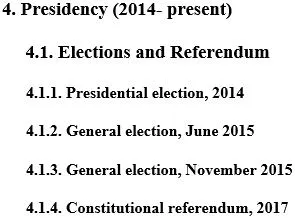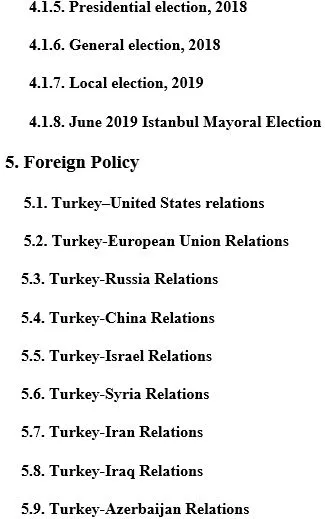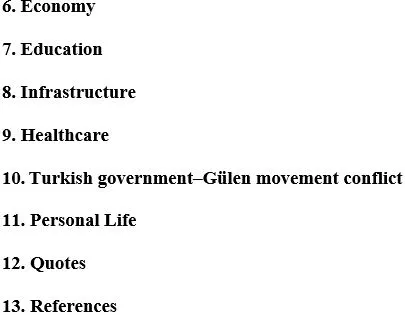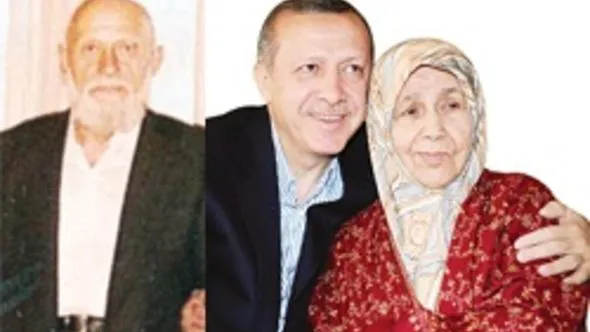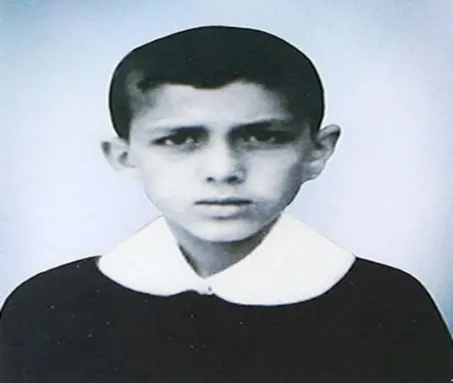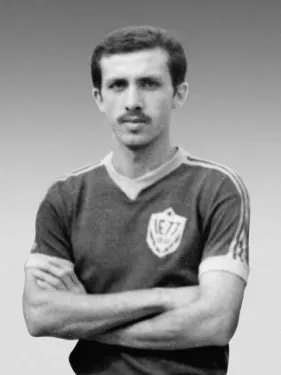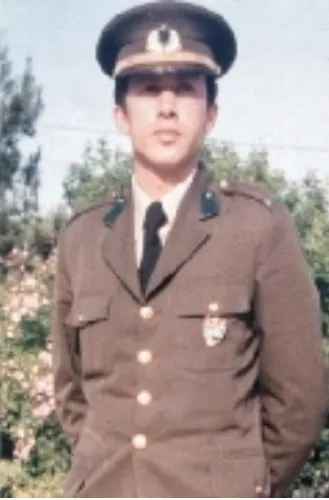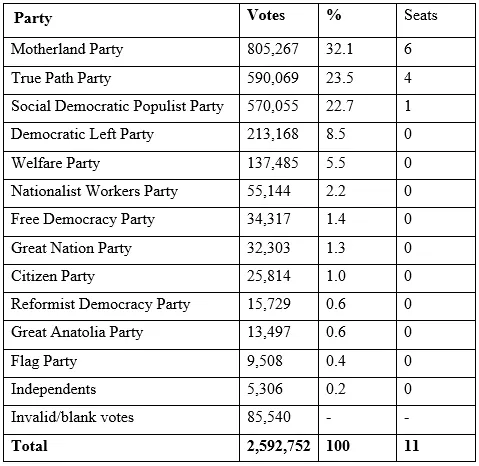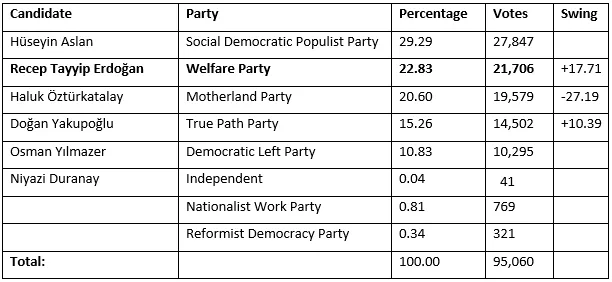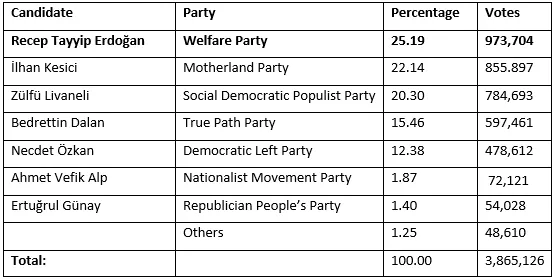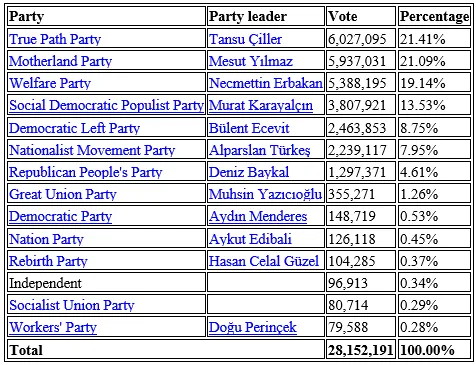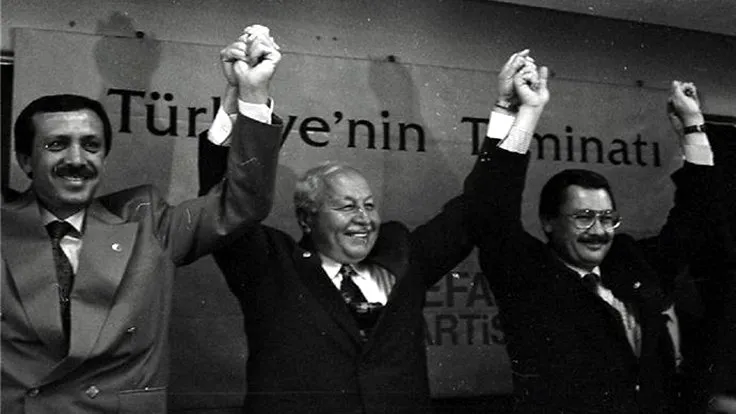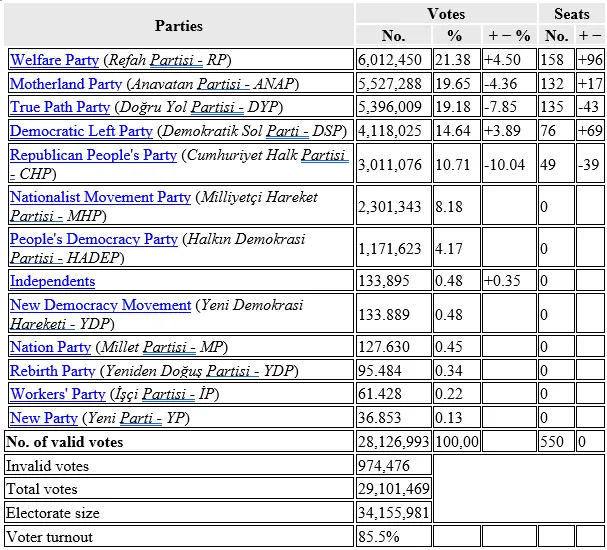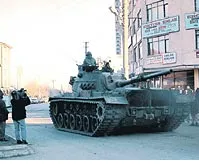![]()
Copyright © 2019 Mehmet Karahan
All rights reserved. Except for brief quotations in a review, this book, or any part thereof, may not be reproduced, stored in or introduced into a retrieval system, or transmitted, in any form or by any means, electronic, mechanical, photocopying, recording or otherwise, without the prior written permission of the Publisher.
ISBN: 978-0-3555-8101-0
eISBN: 978-6-1406-5607-9
1. Early Years and Education
Erdoğan was born in the Kasımpasa quarter of Istanbul in 26 February 1954. Erdoğan’s family originates from Güneysu, Rize which is is a province of north-east Turkey, on the eastern Black Sea coast. His parents are Ahmet Erdoğan and Tenzile Erdoğan. His father Ahmet Erdoğan (1905 – 1988) was a Captain in the Turkish Coast Guard and his mother Tenzile Erdoğan (1923-2011) was a tailor. Recep Tayyip Erdoğan had a brother Mustafa (b. 1958) and a sister Vesile (b. 1965). His summer holidays were mostly spent in Güneysu, Rize.
Figure 1: Ahmet Erdoğan(father), Recep Tayyip Erdoğan and Tenzile Erdoğan(mother)
Recep Tayyip Erdoğan graduated from Kasımpaşa Piyale Primary School in 1965. When he was a teenager, he sold lemonade and sesame buns (simit) on the streets of the Istanbul's rougher districts to earn extra money. He completed his high school education at Istanbul Imam Hatip School (Religious Vocational High School) in 1973. Having succeeded in the necessary examinations for additional courses, Erdoğan also received a diploma from Eyüp High School. At that time, Imam Hatip School students had to take additional courses from another high school for entering the university examination because İmam Hatip Schools’ curriculum did not include some courses such as mathematics and physics. He later studied Business Administration at the Aksaray School of Economics and Commercial Sciences, today known as Marmara University's Faculty of Economics and Administrative Sciences. Erdoğan graduated from the university in 1981.
Figure 2: Erdoğan was a Primary school student in 1965
In his youth, Erdoğan played semi-professional football at some local clubs. Fenerbahçe wanted him to transfer to the club but his father prevented it.
Erdogan’s adventure in football began when he was 15. He and his friends used to play with balls made out of paper in their neighborhood. While at the amateur club, Erokspor advised him to play in Camialtı, another leading amateur club in the 1970s. He played as a forward for Camialtı for seven years. He was also studying and doing youth politics at the same time.
After Camialtı, he was signed by İETT and played for seven years there. He enjoyed five titles in his seven years at İETT. It was a personal milestone for him. He was the captain there. He saw the red card once only in his career. It was because he objected the referee's decision.
Figure 3: Erdoğan in IETT Sports Club
Speaking of how Erdogan's parents saw football as a career, Erdoğan told, "My mother never complained about it. She used to wash and iron my jersey. However, I could hardly convince my dad. My father would always say that I must study. He learned later that I was playing in a football club."
Mr. Erdoğan married Emine Gülbaran (b. 1955, Siirt) on 4 July 1978. The couple has two sons; Ahmet Burak and Necmettin Bilal, and two daughters; Esra and Sümeyye. Erdogan's father, Ahmet Erdoğan, died in 1988 and his 88-year-old mother, Tenzile Erdoğan, died in 2011.
2. Early politicial career
While he was studying business administration and playing semi-professional football, Erdoğan engaged in politics by joining the National Turkish Student Union, an anti-communist action group. In 1974, he wrote, directed and played the lead role in the play Maskomya, which presented Freemasonry, Communism and Judaism as negative concepts.
In 1976, he became the head of the Beyoğlu youth branch of the Islamist National Salvation Party (MSP), and was later promoted to chair of the Istanbul youth branch of the party. He hold this position until 1980 military coup.
The National Salvation Party was dissolved in the wake of a 1980 military coup. One year after the 12th September 1980 military coup, Erdogan earned a graduate degree from Marmara University’s Faculty of Economics and Administrative Sciences in 1981. He served as consultant and senior executive in the private sector during the military coup era when the political parties were closed down.
Recep Tayyip Erdogan completed his military service as a reserve officer with the Istanbul Hasdal 77th Infantry Unit in 1982, after his training at the Tuzla Infantry School.
Figure 4: Erdoğan during his military service in 1982 in Tuzla, Istanbul.
Erdoğan return to political life with the Welfare Party, founded in 1983, and he was elected the Beyoğlu District Head of the Welfare Party in 1984. In 1985, he was elected the Istanbul Provincial Head of the Welfare Party and around the same time he became the member of the Central Executive Board of the Welfare Party.
Amid his incumbency as Istanbul Provincial Head, Recep Tayyip Erdoğan did ventures that went for asking the cooperation of ladies and youth in politics, hence stepping toward helping politics to be upheld and regarded among the majority.
2.1. Turkish parliamentary by-elections, 1986
The Turkish parliamentary by-elections of 1986 were held on 28 September 1986 with a specific end goal to choose 11 Members of Parliament to the Grand National Assembly of Turkey. The by-elections were held because of the vacation of 11 seats over the span of the seventeenth parliament. They took place in eleven different electoral districts, spanning ten provinces.
Erdoğan was the MP candidate for Istanbul from the Welfare Party. Welfare Party lost the by-elections and Erdoğan was not elected as an MP.
Table 1: Results of the 1986 by-elections
2.2. Beyoglu local elections, 1989
Erdoğan stood up as a mayor candidate for the Beyoğlu of Istanbul. The figures presented below are the results of the 1989 Beyoğlu local elections.
Table 2: Beyoğlu local elections, 1989
2.3. General elections, 1991
Erdoğan became a candidate for parliament membership again and was elected in 1991 as one, after his party overcame the limit. Nevertheless, Supreme Committee of Elections dropped his parliament membership due to "preferential voting system". Rather than him, Mustafa Baş entered the parliament in that year.
2.4. Mayor of Istanbul
Erdoğan proceeded with his obligation as Istanbul Head of Province until 1994. In the local elections of 27 March 1994, Erdoğan was elected Mayor of Istanbul, with a plurality (25.19%) of the popular vote and became Metropolitan Mayor of Istanbul contradicting all estimations of media and surveys. The figures presented below are the results of the 1994 Istanbul mayoral elections.
Table 3: Istanbul mayoral elections, 1994
Amid his term in office as Mayor, he delivered remedy findings and answers for the constant issues of Istanbul, one of the world's most significant metropolitan cities through his political capacities, the significance he appended to cooperation and fruitful administration in HR and financial issues. The water issue was overwhelmed by laying several kilometers of new pipe line, the junk issue was comprehended through the foundation of the most current reusing offices and the issue of air contamination finished with the natural gas ventures created amid Erdoğan's term in office. In excess of 50 bridges, passengerways and turnpikes were built for solving traffic congestion and transportation deadlock and numerous more projects which would control alternate organizations in the city were created. Avoiding potential risk for the right effort of the city assets and to forestall defilement, Mr. Erdoğan paid a large portion of the obligations of the Istanbul Municipality which he assumed control with its 2 billion dollars obligation and he amid his residency accomplished speculations worth 4 billion dollars. Mr. Erdoğan, in this manner, achieved a leap forward in the civil history and keeping in mind that his works filled in as great models for different leaders, he won the certainty of the general population.
Erdoğan started the principal roundtable of chairmen amid the Istanbul gathering, which prompted a worldwide, sorted out development of leaders. A seven-part global jury from the United Nations consistently granted Erdoğan the UN-HABITAT grant.
2.5. Coalition Government and 1997 Military Memorandum
Welfare Party received over 19 percent of votes cast in the municipal elections of March 27, 1994. In 1994, Welfare Party captured the mayor’s post in Turkey’s two largest cities. (Istanbul and Ankara)
Table 4: 1994 local elections
Figure 5: Erdoğan, Erbakan and Melih Gökçek, 1994 (Left to right)
The Welfare Party received over 21 percent of votes in the national elections of December 24, 1995. Despite Welfare Party captured more seats in the Turkish Grand National Assembly than any other party, it was rebuffed by other parties in its attempts to form a coalition government. After the repeated failure of centrist parties to form a viable coalition government, President Demirel offered Prof. Dr. Necmettin Erbakan a new opportunity to create a government. After finding an unlikely coalition partner in the avowedly anti-Islamist True Path Party (Doğru Yol Partisi-DYP), Erbakan became Turkey’s first Islamist prime minister in 1996.
Table 5: 1995 general election
Figure 6: Tank moving on the streets of Sincan
Erbakan’s early politicial activism, which included state visits to Iran and Libya, and efforts to establish an economic bloc of Muslim countries (D-8) were actively questioned were actively questioned by leaders of other politicial parties and the military establishment.
Protests were arranged by the Sincan municipality in Ankara, against alleged Israeli human rights violations that took place in guise of an "Al-Quds night" on 31 January 1997. The building in which the event took place was plastered with posters of Hezbollah and Hamas. As a reaction to the demonstration, tanks moved to the streets of Sincan on 4 February.
On 28 February 1997, the generals submitted their views on issues regarding secularism and political Islam on Turkey to the government at the National Security Council (MGK) meeting. The MGK made several decisions during this meeting, and Prime Minister Necmettin Erbakan from the Welfare Party was forced to sign the decisions, some of whi...
